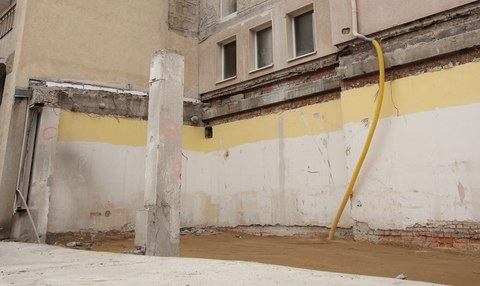May 15, 2025
Fall in the number of building demolitions in Germany
Study shows potential for long-lasting and resource-efficient construction methods
Bonn/Dresden, Month DD, YYYY – The number of building demolitions in Germany is decreasing year by year. This is one of the key findings of the research project “Long-Lasting Real Estate (LoLaRE): Requirements for sustainable buildings with long service lives,” which was conducted by the Institute of Construction Management under the direction of Prof. Jens Otto at TUD Dresden University of Technology. The project was funded by the Federal Ministry for Housing, Urban Development and Building (BMWSB) as part of the Future of Construction (German: Zukunft-Bau) Innovation Program. The report, which has now been published, is the first to analyze statistical data on building demolition in Germany between 2007 and 2021 and examines the reasons for tearing down buildings.
According to the study, demolition figures have fallen sharply since 2018. On average, just under 12,000 buildings were demolished each year, with single-family homes accounting for the largest share. Particularly striking is the significant decline in the demolition of residential buildings, which fell by 36 percent. By comparison, the decline for non-residential buildings was 19 percent. This is a positive development with regard to resource conservation and climate protection.
The majority of the demolished residential buildings were constructed between 1949 and 1978. Even so, 17 percent of demolished residential buildings were less than 43 years old. The main reasons for demolition were the construction of new residential buildings and the re-purposing of the newly available space.
Decision-making processes and influencing factors
In addition to a statistical analysis, the study surveyed experts who are familiar with the decision-making processes for or against demolition. The results show that factors such as historic preservation and protected status are conducive to retaining buildings, while building regulations and economic considerations often lead to demolition. High renovation costs, especially in connection with strict fire protection regulations or limited structural reserve capacities of buildings, play a significant role.
“A decisive factor in the longevity of buildings is their adaptability to new requirements,” says Charlotte Dorn, who supervised the project at TU Dresden. “Parameters such as story heights, vertical access, load-bearing structures, and load reserves are crucial here. The study suggests that these factors should be taken into account during the planning phase of new buildings so as to ensure long-term usage options and promote sustainability,” explains Dorn.
Practical findings for sustainable building design
The investigation revealed that the decision for or against demolition requires a complex interplay of legal, economic, technical, and cultural aspects. A quantitative assessment within the study also examined the relationship between usage flexibility, ecological footprint, and life cycle costs, using a real-world example.
“The results of this research project provide valuable insights into how we can reduce the number of building demolitions and plan more durable, adaptable buildings. It highlights the importance of flexibility in structures for long-term building design and urban planning,” says Daniel Wöffen, who worked closely on the study at the Federal Institute for Research on Building, Urban Affairs and Spatial Development (BBSR).
The BBSR implements the Future of Construction Innovation Program on behalf of the BMWSB. The complete report is available here: https://doi.org/10.25368/2024.322. For a concise summary, see the transfer report published by the BBSR.
Dorn, C.; Otto, J., 2025: Gebäudeabbrüche in Deutschland: Ursachen und Einflussfaktoren für die Verlängerung der Nutzungsdauer von Gebäuden. Published by: BBSR – Federal Institute for Research on Building, Urban Affairs and Spatial Development Zukunft Bau – Forschung KOMPAKT 1/2025. Bonn. 10.58007/vm24-9921.
Contact:
Christian Schlag
Press and Public Relations Advisor
Staff Director and Professor
Federal Institute for Research on Building, Urban Affairs and Spatial Development (BBSR)
at the Federal Office for Building and Regional Planning (BBR)
Deichmanns Aue 31–37
53179 Bonn
Tel.: +49 228 99 401-1484
***
The Federal Institute for Research on Building, Urban Affairs, and Spatial Development (BBSR) at the Federal Office for Building and Regional Planning (BBR) is a departmental research institute that advises the federal government on urban and spatial development, housing, real estate, and construction.

